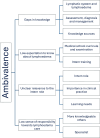Comfortable knowing little about lymphoedema? A qualitative study of medical interns in Australia
- PMID: 39833009
- PMCID: PMC11748771
- DOI: 10.1136/bmjopen-2024-089789
Comfortable knowing little about lymphoedema? A qualitative study of medical interns in Australia
Abstract
Objectives: Knowledgeable doctors are needed for timely assessment, diagnosis and management of lymphoedema. This qualitative study explored the thoughts and feelings of Australian interns (medical graduates in their first postgraduate year) towards (i) their understanding of the lymphatic system and lymphoedema, (ii) curricula pertaining to lymphoedema within their Australian medical degree and (iii) how they perceive that their understanding and medical training in lymphoedema influence their clinical practice.
Study design and methods: Qualitative semistructured interviews were conducted with interns employed within their first postgraduate year in Australia. Interviews were conducted via Microsoft Teams or telephone, video-recorded, transcribed verbatim and analysed using thematic analysis. Inductive (data-driven) codes identified in the data were organised into themes.
Results: The overarching theme was one of ambivalence. Participants noted that they had knowledge gaps related to lymphoedema (theme 1), but were not concerned by them, as they did not consider lymphoedema a condition they were expected to know about at medical school or in clinical practice (theme 2). Furthermore, they questioned the relevance of lymphoedema to their role (theme 3) and they considered lymphoedema care to be the responsibility of others (theme 4).
Conclusion: These findings suggest a discord between what interns in this study recall being taught about lymphoedema and what current literature suggests newly graduated doctors should know. Future research is needed to explore the extent to which these findings extend to the perceptions of more senior doctors and how these findings impact the unmet needs of people with lymphoedema in Australia.
Keywords: Chronic Disease; MEDICAL EDUCATION & TRAINING; PUBLIC HEALTH; Physicians; QUALITATIVE RESEARCH.
© Author(s) (or their employer(s)) 2025. Re-use permitted under CC BY-NC. No commercial re-use. See rights and permissions. Published by BMJ Group.
Conflict of interest statement
Competing interests: None declared.
Similar articles
-
Which common clinical conditions should medical students be able to manage by graduation? A perspective from Australian interns.Med Teach. 2002 Jan;24(1):16-22. doi: 10.1080/014215901200901041. Med Teach. 2002. PMID: 12098452
-
Improving care for cancer-related and other forms of lymphoedema in low- and middle-income countries: a qualitative study.BMC Health Serv Res. 2022 Apr 8;22(1):461. doi: 10.1186/s12913-022-07840-7. BMC Health Serv Res. 2022. PMID: 35395942 Free PMC article.
-
Junior doctors' experiences of the medical internship: a qualitative study.Int J Med Educ. 2022 Mar 23;13:66-73. doi: 10.5116/ijme.6229.d795. Int J Med Educ. 2022. PMID: 35321942 Free PMC article.
-
Participation and progression: new medical graduates entering professional practice.Adv Health Sci Educ Theory Pract. 2011 Dec;16(5):627-42. doi: 10.1007/s10459-011-9284-5. Epub 2011 Feb 27. Adv Health Sci Educ Theory Pract. 2011. PMID: 21359857
-
Exploration of the perceptions of emergency physicians and interns regarding the medical documentation practices of interns.Emerg Med Australas. 2013 Aug;25(4):302-7. doi: 10.1111/1742-6723.12096. Epub 2013 Jul 21. Emerg Med Australas. 2013. PMID: 23911020
References
-
- Keeley V, Moffatt C. Cham:Springer International Publishing. Lymph Epidemiol. 2018:165–75. doi: 10.1007/978-3-319-52423-8_13. - DOI
MeSH terms
LinkOut - more resources
Full Text Sources
Medical

